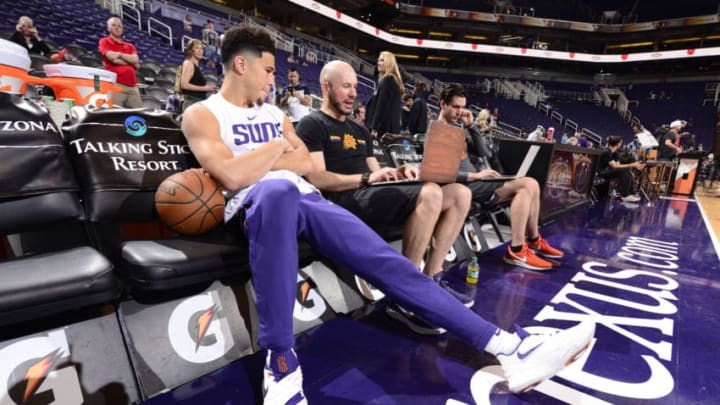
For nearly a decade, the Phoenix Suns have been in a perpetual cycle of being in “draft mode.” Now that they have a young (drafted) core, this cycle must end. Now.
Outside of the Apple variety, turnover is usually something you want to avoid. This is especially true in sports because it either involves giving the ball to the opposing team, or something the Phoenix Suns have perfected a new kind of unwanted turnover: their roster.
Fansided’s Gerald Bourguet posted the following tweet that truly magnifies what Devin Booker has had to endure during his first four years in the league by providing a full list of his teammates, including those from this coming year.
69. That’s right, Devin Booker has had 69 different teammates over the course of five years, including the roster as constructed for this year (not to mention five different head coaches and two general managers – but that’s a post for another day).
To keep the uncanny stats rolling, not a single player (or coach) from the 2017-2018 season remains on the roster, save for Booker.
That was only two years ago.
It doesn’t matter if you are running an NBA franchise or a bakery, having that much turnover is a recipe for disaster.
Remember the famous picture of the Cleveland Browns jersey with all the quarterbacks that came and left, year after year?
That has essentially been every position besides shooting guard for the Phoenix Suns over the last five years.
With Team USA stinking up the international basketball stage still fresh on the mind, it reminds me of the excuses analysts gave in the early 2000s when the US National Team took its first ever losses in the NBA player eligibility era.
They said something to the effect of, “you have to understand all these other countries’ players have been playing together for years. This US team has only been playing together for a couple weeks.”
At the time, I thought this was nonsense. After all, the US had the likes of Dwayne Wade, Tim Duncan, and Allen Iverson (not to mention Phoenix Suns’ greats Amar’e Stoudemire and Shawn Marion) while other countries did not.
Talent surely must outweigh team unity.
While I still think that’s generally true, strong team cohesion can make up for a lack of superior talent.
The Phoenix Suns have long been without both teammate cohesion and superior talent.
To compare this to college basketball, universities like Kentucky and Duke who target one-and-done recruits are successful because those guys are typically more talented than traditional four-year players.
Programs like Arizona State, who can’t bring in five-star recruits as consistently as the traditional blue bloods, need to rely on good players who mesh well together.
These types of teams can, and in college basketball, often do beat superior-yet-new-to-their-teammates talent.
Look no further than the Phoenix Suns’ pair of NCAA National Champions, Mikal Bridges and Ty Jerome. Both won at colleges that focused on building a team over time, rather than compiling a group of short-term superstars.
While it is by no means a perfect analogy and there are several more factors that play into the NBA, the Suns are like Arizona State and the Lakers are like Kentucky.
The Lakers have gone the route of short-term additions like LeBron James and Anthony Davis. It is easier for them to do this because, like it or not, they are an NBA blue blood.
The Phoenix Suns are not.
